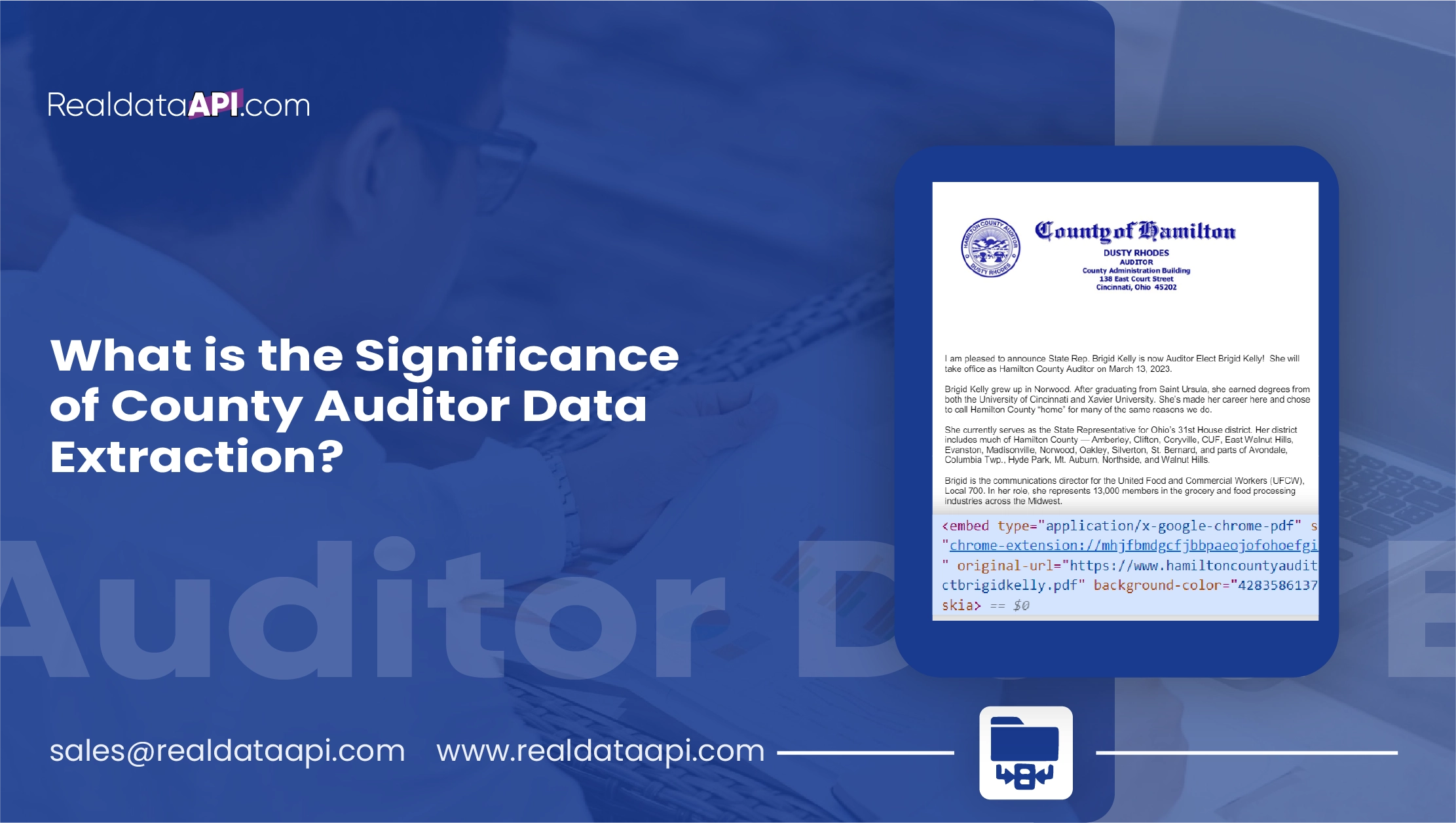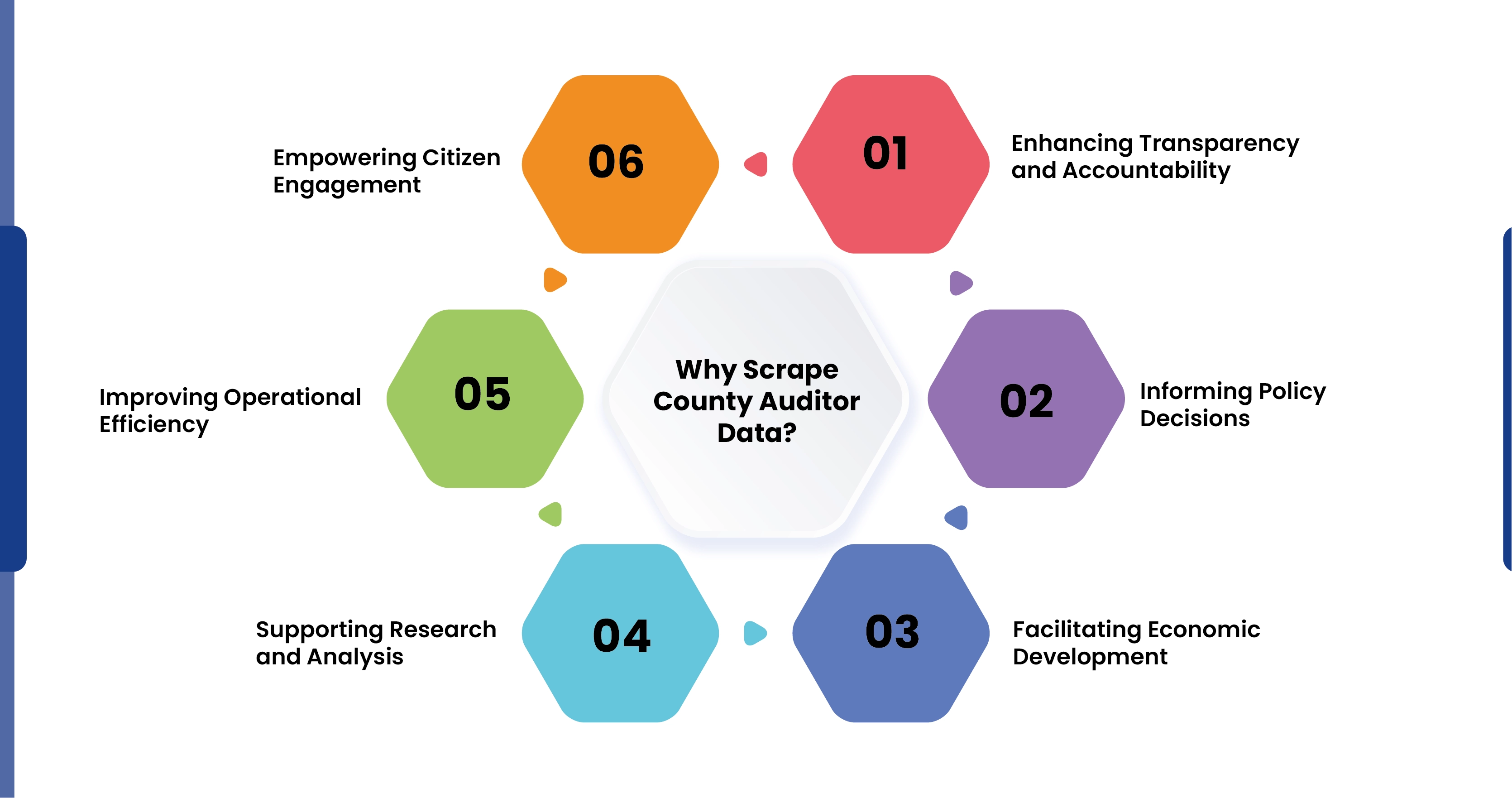What is the Significance of County Auditor Data Extraction?

Introduction
County auditor data extraction in public administration and governance is pivotal in ensuring transparency, accountability, and efficient decision-making. County auditors oversee financial records, assess property values, and manage various aspects of local government finances. Extracting and analyzing data from county auditor records can provide valuable insights into revenue sources, expenditure patterns, property assessments, and more. In this blog post, we'll delve into the importance of county auditor data scraping and its implications for stakeholders.
What is County Auditor?
A county auditor is a government official overseeing financial records, budgetary management, and fiscal operations at the county level. The role of a county auditor varies depending on the jurisdiction, but typical responsibilities include:
Auditing financial transactions.
Ensuring compliance with accounting standards and legal regulations.
Preparing financial reports for government agencies and the public.
County auditors are critical in promoting transparency, accountability, and sound fiscal management within local government entities. They serve as independent watchdogs, ensuring taxpayer dollars are spent efficiently and effectively. County auditors conduct audits to evaluate the financial performance of government departments and programs, identify areas of financial risk or inefficiency, and recommend corrective actions to address deficiencies.
County auditors, in addition to their financial oversight, often manage property assessments and taxation processes. They meticulously assess property values, calculate property taxes, and maintain comprehensive records of property ownership and transfers. This diligent record-keeping should instill a sense of security in property owners, knowing that their rights are being safeguarded.
Why Scrape County Auditor Data?

Enhancing Transparency and Accountability: County auditor data extraction fosters transparency by making financial information accessible to the public. By scraping county auditor records, citizens can gain insight into how taxpayer dollars are being allocated and spent by local government entities. This transparency holds government officials accountable for their financial decisions and encourages responsible fiscal management.
Informing Policy Decisions: County auditor data collection can inform policy decisions at the local, regional, and state levels. By analyzing trends in property assessments, tax revenues, and expenditure patterns, policymakers can identify areas of need, allocate resources effectively, and implement targeted interventions to address community priorities.
Facilitating Economic Development: County auditor data extraction can support economic development initiatives by providing information on property values, zoning regulations, and land use patterns. Entrepreneurs, investors, and developers can use this data to identify potential investment opportunities, assess market trends, and make informed decisions about business expansion or real estate development projects.
Supporting Research and Analysis: Researchers, academics, and analysts can leverage county auditor data scraping for a wide range of studies and analyses. From assessing the impact of tax policies to studying demographic trends and socioeconomic disparities, county auditor records provide a rich source of data for scholarly research and data-driven analysis.
Improving Operational Efficiency: County governments can scrape county auditor data to streamline administrative processes, identify cost-saving opportunities, and improve operational efficiency. By analyzing spending patterns and budget allocations, government agencies can optimize resource utilization and enhance service delivery to residents.
Empowering Citizen Engagement: Access to county auditor data empowers citizens to actively participate in local governance processes. By providing access to information on public finances, property assessments, and government expenditures, citizens can engage in informed discussions, hold elected officials accountable, and advocate for policies that align with community priorities.
Does It Really Help to Extract County Auditor Data?
When you extract county auditor data, it provides numerous benefits and valuable insights for various stakeholders. Here are some ways in which it helps:
Compliance and Regulation: Extracting county auditor data helps ensure compliance with financial regulations and reporting requirements. By accessing accurate and up-to-date financial information, government agencies can fulfill their obligations to regulatory bodies and demonstrate transparency in their financial management practices.
Risk Management: The proactive nature of county auditor data extraction is a powerful tool for identifying and mitigating financial risks. By scrutinizing financial data, government agencies can spot anomalies, irregularities, or potential fraud, enabling them to intervene in a timely manner and implement risk mitigation measures.
Revenue Forecasting: Extracting county auditor data supports revenue forecasting and budget planning processes. By analyzing historical revenue trends and projections, government agencies can make informed decisions about resource allocation, tax policies, and fiscal priorities to ensure financial stability and sustainability.
Citizen Engagement and Empowerment: The empowerment that comes with access to county auditor data is a catalyst for citizens to actively engage in local governance processes. By offering transparency into government finances and operations, citizens are equipped to make informed decisions, participate in public debates, and advocate for policies that reflect community interests and priorities.
Performance Evaluation: County auditor data extraction facilitates performance evaluation and accountability mechanisms within government agencies. By analyzing key performance indicators and financial metrics, agencies can assess their effectiveness, identify areas for improvement, and implement corrective actions to enhance service delivery and organizational efficiency.
Planning and Development: County auditor data supports urban planning and community development initiatives. By analyzing land use data, property assessments, and infrastructure investments, stakeholders can make informed decisions about land development, transportation projects, and community revitalization efforts to promote sustainable growth and quality of life.
How Efficient is a County Auditor Data Scraper?
A County Auditor Data Scraper can be highly efficient when adequately designed and implemented. Here are some factors that contribute to its efficiency:
Accuracy: A well-designed scraper should be able to extract data from county auditor websites without errors or inaccuracies. This ensures that the extracted data is reliable and can be used confidently for analysis and decision-making purposes.
Speed: Efficiency is also measured by the speed at which the scraper can extract data. A fast scraper can process large volumes of data quickly, allowing users to access timely insights and make informed decisions.
Robustness: A robust scraper can handle various data formats, website structures, and potential obstacles such as CAPTCHA challenges or website updates. It should adapt to website layout or data structure changes without breaking or failing to extract the necessary information.
Customization: The ability to customize the scraper according to specific user requirements and preferences enhances its efficiency. Users should have the flexibility to define the data fields to be extracted, specify filtering criteria, and schedule automated extraction tasks as needed.
Scalability: An efficient scraper should be able to scale up to handle large volumes of data or accommodate multiple users simultaneously. This ensures that it can meet users' growing demands and continue to perform effectively as the organization's data needs evolve.
Resource Optimization: A county auditor data scraper must efficiently use computational resources such as memory and processing power. A well-optimized scraper should be able to extract data efficiently while minimizing resource consumption to reduce costs and improve overall performance.
Overall, the efficiency of a County Auditor Data Scraper depends on factors such as accuracy, speed, robustness, customization capabilities, scalability, and resource optimization. By focusing on these aspects, developers can create a scraper that meets users' needs and delivers valuable insights from county auditor data efficiently and effectively.
Conclusion
Real Data API offers a vital tool for enhancing transparency, informing decision-making, and fostering civic engagement at the local level. By leveraging Real Data API to access and analyze county auditor records, stakeholders can gain valuable insights into government finances, property assessments, and economic trends. This data empowers stakeholders to contribute to more effective and responsive governance. Access Real Data API today and unlock the insights needed to drive positive change in your community!
Know More: https://www.realdataapi.com/significance-of-county-auditor-data-extraction.php